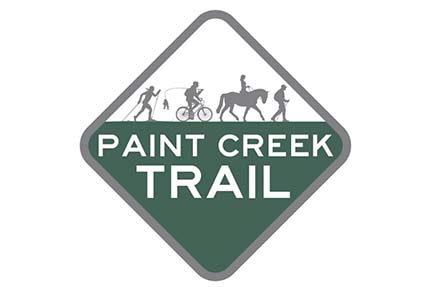
by Becky Andrus | Sep 14, 2021 | Local News, Recreation
PAINT CREEK TRAIL TO HOST RIBBON CUTTING AND RECOGNITION CEREMONY
Ceremony planned for Tuesday, September 21, 2021 at 5:00 p.m. on the Paint Creek Trail
Oakland Township, Michigan: Join the Paint Creek Trailways Commission on Tuesday, September 21st, 2021 at 5:00 p.m. on the Paint Creek Trail to celebrate the opening of Bridge 33.7 and the 2019 trail resurfacing along with a Recognition Ceremony for several past Trailways Commissioners.
Bridge 33.7, a 95-year-old timber pedestrian bridge located on the trail between Dutton and Silverbell Roads, was completely replaced during the summer of 2019. The design of the new seventy-five-foot keystone-style steel truss bridge greatly improves accessibility for trail users and also supports a greater load capacity, allowing maintenance and emergency vehicles to safely cross. The bridge is fundamental to the operations of the Paint Creek Trail and the new bridge provides safe, continuous use of the trail for cyclists, pedestrians, equestrians, nature lovers, and anglers. Funding for the project was provided by the Michigan Department of Natural Resources’ Trust Fund grant program, a Transportation Alternative Program (TAP) grant from the Michigan Department of Transportation (MDOT), and a grant from the Ralph C. Wilson, Jr. Foundation. Oakland Township Parks and Recreation, who is responsible for the maintenance of Bridge 33.7, also contributed a $156,000 cash match for the bridge replacement.
The ribbon cutting ceremony will also celebrate the Trail’s 2019 resurfacing. As part of this project, the entire Paint Creek Trail was resurfaced with crushed limestone. Resurfacing of the trail is an ongoing event of a cyclical nature and last occurred in 2004. The four Paint Creek Trailways Commission member communities of the Oakland Township, Orion Township, Rochester, and Rochester Hills each committed funds towards the resurfacing of its section of the trail. Additional funding for the project was generously provided by the Ralph C. Wilson, Jr. Foundation. This project greatly improved the smoothness and regularity of the trail, and provides a safer and more predictable and enjoyable surface for all trail users.
In addition to the ribbon cutting, the Trailways Commission will also honor six past Trailways Commissioners for their service to the Paint Creek Trailways Commission. Each of the past Commissioners will be presented with a commemorative pewter Paint Creek Trail spike in a display box. Being honored that day are Dr. Susan Bowyer, former Commissioner for the city of Rochester Hills; Frank Ferriolo, former Commissioner for Oakland Township; Kim Russell, former Commissioner for the city of Rochester; Lisa Sokol, former Commissioner for Orion Township; and Hank Van Agen, former Commissioner for Oakland Township. Former Paint Creek Trailways Chairperson and Commissioner for Rochester Hills Rock Blanchard will also be honored at the event with a resolution recognizing his longtime service to the Commission.
Attendees are asked to please park at the Paint Creek Cider Mill, 4480 Orion Rd., Rochester, Michigan, 48306 and walk 1¼ miles south down the Paint Creek Trail to the bridge site for the ceremony. Please contact the Trail office at 248-651-9260 if you have a disability and require accommodations to fully participate in the event.
The Trailways Commission had planned to hold a ribbon cutting in 2020 to celebrate the opening of the new bridge and the trail resurfacing but social distancing guidelines prevented it. “The Commission is excited to celebrate the completion of these two projects with our member communities, our generous project supporters, and our enthusiastic trail users,” said Paint Creek Trail Manager Melissa Ford.
“During this ribbon cutting event, we are celebrating the completion of many needed projects along the Trail. We also are honoring our past Commissioners for their community service,” said Donni Steele, Paint Creek Trailways Commission Chairperson. “Over the past several years, these Commissioners selflessly donated their time and energy to improving, watching and caring for our Paint Creek Trail – truly, one of our community gems,” she continued. “We are also very thankful for the generous grants bestowed upon us, along with the continuous community collaboration, which allowed these long-standing projects to become a reality.”
About the Paint Creek Trail: The Paint Creek Trail was the first non-motorized rail-to-trail in the State of Michigan, and traverses through the communities of Rochester, Rochester Hills, Oakland Township, Orion Township, and the Village of Lake Orion. The Trail annually serves approximately 100,000 pedestrians, cyclists, equestrians, anglers, nature enthusiasts, and users of all ages and abilities. For more information about the Paint Creek Trail, visit www.paintcreektrail.org, or call (248) 651-9260.
About the Michigan Natural Resources Trust Fund: The Michigan Natural Resources Trust Fund is financed by royalties paid on the sale and lease of state-owned oil, gas, and mineral rights. Applications are accepted from state and local government agencies for the acquisition and development of outdoor recreation facilities. The deadline for applications is April 1st of each year, with the decisions made in early December. The MNRTF makes the grant recommendations and submits them to the state legislature for approval and appropriations.
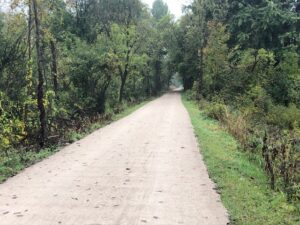
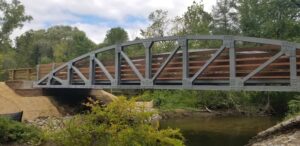
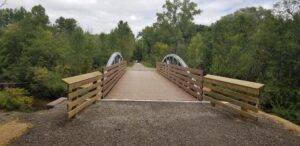
by Becky Andrus | Sep 10, 2021 | Recreation
|
 |
– DNR News –
|
| This Sept. 2 news release is being reissued to update weblinks. |
| Sept. 2, 2021
Contact: DNR-Public-Info@Michigan.gov
DNR postpones full reopening of some facilities until October
Michigan Department of Natural Resources customer service centers and certain field offices will remain on a three-days-per-week open to the public schedule – Tuesdays, Wednesdays and Thursdays – until at least Oct. 4.
The three-day schedule for these facilities has been in place since July 20. The offices had been set to reopen to the public five days a week after Labor Day, prior to new coronavirus advisories and recommendations.
The affected customer service centers include Baraga, Bay City, Cadillac, Detroit, Escanaba, Gaylord, Lansing, Marquette, Newberry, Plainwell, Roscommon, Sault Ste. Marie and Traverse City.
These DNR offices sell hunting and fishing licenses and fuelwood permits and answer questions about hunting and fishing regulations, trails and many other outdoor recreation topics. Residents and visitors frequently stop at these locations while traveling throughout Michigan.
Fuelwood cutting permits, provided at DNR customer service centers, are free and downloadable for this season.
Find the location nearest you on this map of DNR customer service centers.
Field offices with the same public availability include Crystal Falls, Naubinway and Norway.
Additional open dates, information
- Headquarters buildings at Michigan state parks and recreation areas and state-managed harbors are open.
- Michigan History Center museums and historic sites vary by location. The Michigan Iron Industry Museum in Negaunee is open Wednesday-Sunday (9:30 a.m. to 4:30 p.m.), while the flagship Michigan History Museum in Lansing is open for weekend hours (Fridays/Saturdays 10 a.m. to 4 p.m. and Sundays 1 to 5 p.m.) and, starting Sept. 7, by appointment for groups Monday through Thursday. The Mann House and Tawas Point Lighthouse are closed for the 2021 season.
- The Archives of Michigan is open by appointment Monday-Friday (1 to 5 p.m.) and, starting Sept. 7, Saturdays (10 a.m. to 4 p.m.). Staff continues to also provide reference services by phone and email.
- The State of Michigan has adopted a mask mandate for the Michigan Library and Historical Center building, which is home to the Michigan History Museum and the Archives of Michigan. All visitors must wear a mask when in these spaces.
- On Belle Isle in Detroit, the Anna Scripps Whitcomb Conservatory is now open 10 a.m. to 5 p.m. Wednesdays through Sundays. The Belle Isle Aquarium (operated by the Belle Isle Conservancy) is open to the public 10 a.m. to 4 p.m. Fridays through Sundays. The casino and Flynn Pavilion are open for rentals. Please contact the Belle Isle administration office at 313-821-9844.
- All DNR shooting ranges are open. Check each range’s webpage for dates and hours of operation.
- The Outdoor Adventure Center in Detroit is closed through Thursday, Sept. 30 for annual maintenance, upgrades and repair. It will reopen Friday, Oct. 1.
- Check for information on DNR fish hatcheries and weirs.
State parks and campgrounds, state game and wildlife areas, state forests and many other places are open, as they have been throughout the entire COVID-19 pandemic. Follow the DNR’s COVID-19 information page for updates on all facility closures and reopening dates.
There is no longer a statewide requirement to wear a face mask in most settings; however, local health departments, establishments, sports organizers, and school districts may have additional rules that must be followed.
On Aug. 10, 2021, the Michigan Department of Health and Human Services updated its guidance on face coverings. In areas with substantial and high transmission, the Centers for Disease Control and Prevention recommends that everyone (including fully vaccinated people) wear face masks in public indoor settings to help prevent spread of COVID-19, especially the Delta variant, and to protect others. In addition, you will see DNR staff wearing masks. The public is encouraged to do the same. |
| DNR COVID-19 RESPONSE: For details on affected DNR facilities and services, visit this webpage. Follow state actions and guidelines at Michigan.gov/Coronavirus. |
|
| The Michigan Department of Natural Resources is committed to the conservation, protection, management, use and enjoyment of the state’s natural and cultural resources for current and future generations. For more information, go to Michigan.gov/DNR. |
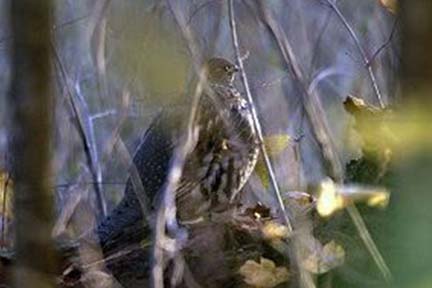
by Becky Andrus | Sep 2, 2021 | Recreation
|
|
 |
– DNR News –
|
|
Sept. 2, 2021
Contacts: Michigan DNR: Julie Melotti, 517-336-5042; Minnesota DNR: Charlotte Roy, 218-328-8876; Wisconsin DNR: Alaina Gerrits, 608-513-6739
West Nile virus survey in ruffed grouse begins third study year

The study of West Nile virus in ruffed grouse will resume this fall in Michigan, after a one-year pause due to the COVID-19 pandemic. In partnership with Minnesota and Wisconsin natural resources departments, the Michigan Department of Natural Resources began this multiyear study in 2018 to better understand the prevalence and distribution of the virus in ruffed grouse in the Upper Great Lakes region.
Results from previous study years suggest that while the virus is present in the Great Lakes region, grouse exposed to the virus can survive and develop antibodies as an immune response. In 2019, 20 of the 281 samples collected tested positive for exposure to the virus. Viral antibodies were confirmed in seven birds and likely in 13 additional birds. Only one juvenile male tested positive for the virus. In 2018, 28 of 213 samples were positive for exposure to the virus, with viral antibodies confirmed in nine birds and likely in 19. Four samples were positive for the virus.
“Though the virus can impact the ruffed grouse population, the impact appears to be minimal in Michigan,” said Julie Melotti, a laboratory technician at the DNR Wildlife Disease Laboratory. “In the Upper Peninsula, the overall health of the grouse population is more dependent on high-quality habitat, such as areas of regenerating aspen stands near stands of mature timber. In these areas, grouse are more likely to be healthier and have stronger immune responses to disease, inclement weather and other limiting factors.”
|

Sample kits have been distributed to grouse hunters in key West Nile virus surveillance areas to collect samples for viral analysis. The samples will be analyzed for antibodies, which indicate exposure to the virus, and heart tissue will be examined to screen for current presence of it. Sample kits were not distributed in 2020 due to the ongoing COVID-19 pandemic, but recently have been distributed to Michigan hunters for data collection during the 2021 season. Hunters who have kits remaining from past seasons are welcome to use them and submit additional samples. Hunters who provide email contact information with their samples will be notified of their results next fall.
|
West Nile virus was first detected in ruffed grouse in Michigan in 2002. Transmitted by mosquitoes, the virus can cause inflammation of the brain, brain lining, and spinal cord and heart lesions in infected birds. Grouse that have contracted the virus may fly erratically, act abnormally, or appear sick, thin and in poor condition. However, these symptoms are not always present in infected grouse. If you find a bird that appears thin or sick, please report your observations to the Wildlife Disease Lab at 517-336-5030 or through the online reporting system Eyes in the Field.
While most humans that contract West Nile virus are generally symptom-free, about one in five will develop a fever with other flu-like symptoms. While spending time outdoors during periods when mosquitoes are active, the DNR recommends using an insect repellent or keeping exposed skin covered. To learn more about the West Nile virus study in ruffed grouse or about the virus in Michigan, see the West Nile Virus and Ruffed Grouse FAQ.
Note to editors: Accompanying photos are available below for download. Caption information follows.
- Ruffed grouse: Results from previous study years suggest that while the West Nile virus is present in the Great Lakes region, grouse exposed to the virus can survive and develop antibodies as an immune response.
- Laboratory: Julie Melotti, a laboratory technician at the Michigan Department of Natural Resources Wildlife Disease Laboratory, examines a ruffed grouse.
|
| DNR COVID-19 RESPONSE: For details on affected DNR facilities and services, visit this webpage. Follow state actions and guidelines at Michigan.gov/Coronavirus. |
|
| The Michigan Department of Natural Resources is committed to the conservation, protection, management, use and enjoyment of the state’s natural and cultural resources for current and future generations. For more information, go to Michigan.gov/DNR. |
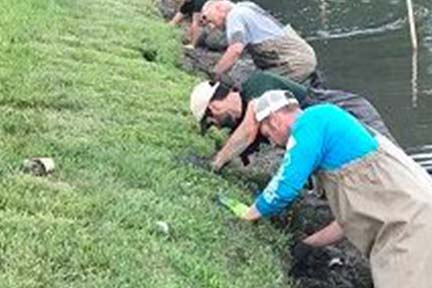
by Becky Andrus | Sep 1, 2021 | Recreation
|
|
|
|
| Sept. 1, 2021
Contact: Joanne Foreman, 517-284-5814 or Erin Campbell, 269-300-9698
Proposals accepted through Nov. 1
Michigan’s Invasive Species Grant Program is now accepting proposals for the 2021 funding cycle, with an anticipated $3.6 million available to applicants.
The program – a joint effort of the Michigan departments of Natural Resources; Environment, Great Lakes, and Energy; and Agriculture and Rural Development – is part of a statewide initiative launched in 2014 to help prevent, detect and control invasive species in Michigan.
An invasive species is one that is not native and whose introduction causes harm, or is likely to cause harm, to Michigan’s environment, economy or human health.
“By engaging the public more actively and encouraging innovative new methods of keeping our Great Lakes water and land healthy this program will continue to be an asset in the battle against invasives,” said Liesl Clark, EGLE director.
Program handbook, webinar
The 2021 grant program handbook outlines program priorities and application guidelines. Applicants also can take advantage of a webinar Wednesday, Sept. 8, to learn more about general grant information, the application process and 2021 priorities.
Both the handbook and webinar registration information are available at Michigan.gov/MISGP. A recorded version of the webinar will be available at this website after Sept. 8.
2021 priorities
The program supports projects that will prevent the introduction or spread of invasive species by engaging the public in prevention practices and reducing the risk of moving invasive species into high-risk areas.
Proposals aiding early detection and response efforts for species on Michigan’s Watch List and proposals increasing regional or statewide response preparedness for new or emerging invasive species are also requested.
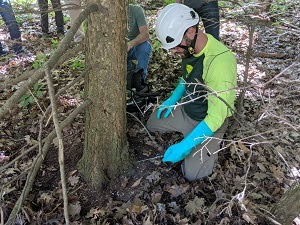 To manage invasive species already established in Michigan, the program targets proposals for novel and efficient control techniques and projects that improve detection and control methods through increased understanding of species biology and ecology. To manage invasive species already established in Michigan, the program targets proposals for novel and efficient control techniques and projects that improve detection and control methods through increased understanding of species biology and ecology.
Proposals to develop or improve tools, such as risk assessments and prioritization models, to inform management and control decisions also are encouraged.
Support is offered to Cooperative Invasive Species Management Areas across the state to implement strategic plans for outreach, detection and control of regional priority species. |
Program progress
The Michigan Invasive Species Grant Program supports projects throughout the state that prevent, detect, manage and eradicate invasive species on the ground and in the water. Total program funding is set by the Legislature and the governor during the annual budget cycle.
 In the last seven years, the program has awarded over $25 million to 173 projects, resulting in management of invasive species including hemlock woolly adelgid, phragmites and red swamp crayfish on more than 60,000 acres of land and water statewide. In the last seven years, the program has awarded over $25 million to 173 projects, resulting in management of invasive species including hemlock woolly adelgid, phragmites and red swamp crayfish on more than 60,000 acres of land and water statewide.
Highlights of the 2020 invasive species program are available in the Michigan Invasive Species Program Annual Report, which includes program-funded projects.
Regional Cooperative Invasive Species Management Areas operate in all of Michigan’s 83 counties, assisting the public in identifying and managing invasive species. Contact information for individual CISMAs can be found at Michigan.gov/Invasives in the Take Action section. |
Important program dates and information
Local, state, federal and tribal units of government, nonprofit organizations and universities may apply for funding to support invasive species projects in Michigan. Full project proposals are due Nov.1. Award announcement is anticipated in March 2022.
Grant requests for general projects can range from a minimum of $25,000 to a maximum of $400,000. CISMAs can request up to $60,000 for annual implementation of prevention, detection and control activities and up to $40,000 for specific survey and treatment projects. Applicants must commit to providing a minimum of 10 percent (in the form of a local match) of the total project cost.
Competitive applications will outline clear objectives, propose significant ecological benefits, demonstrate diverse collaboration and show strong community support.
New this year, all applications must be submitted through the MiGrants online system. Applicants can access the system at MiGrants.Intelligrants.com or follow the link at Michigan.gov/MISGP.
Michigan’s Invasive Species Program is cooperatively implemented by the Department of Environment, Great Lakes, and Energy, the Department of Natural Resources, and the Department of Agriculture and Rural Development.
/Note to editors: Accompanying photos are available below for download. Suggested captions and photo credit information follow:
Tree injection: A certified pesticide applicator prepares a pesticide injection for a hemlock tree infested with hemlock woolly adelgid.
Crayfish: A team from DNR, EGLE and Michigan State University looks for red swamp crayfish in burrows./ |
|
|
|
|
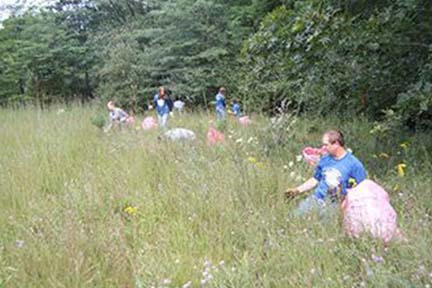
by Becky Andrus | Aug 30, 2021 | Recreation
| Opportunities to get involved with the Michigan DNR for September 2021 |
|
|
|
|
DNR Get Involved – September 2021
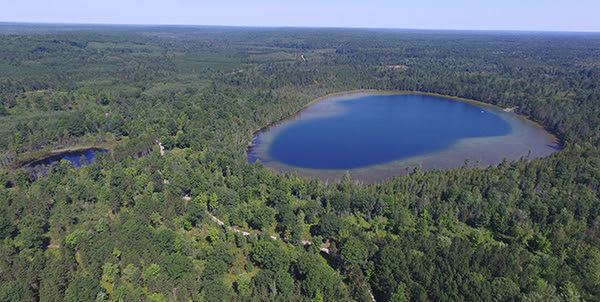
|
Here are a few ways to get involved in taking care of Michigan’s natural resources in September. For more opportunities to volunteer, contribute and provide input, visit Michigan.gov/DNRVolunteers.
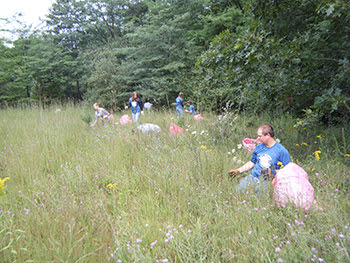 Several state parks in southern Michigan have volunteer stewardship workdays coming up in September. Volunteers are needed to help remove invasive plants that threaten high-quality ecosystems in the parks. Several state parks in southern Michigan have volunteer stewardship workdays coming up in September. Volunteers are needed to help remove invasive plants that threaten high-quality ecosystems in the parks.
Please note that registration is required for all volunteer workdays.
Workdays will take place:
- 8:30 to 11 a.m. Friday, Sept. 3, at Fort Custer Recreation Area (Kalamazoo County).
- 9 a.m. to noon Saturday, Sept. 11, at Bald Mountain Recreation Area (Oakland County).
- 10 a.m. to 1 p.m. Saturday, Sept. 11, at Muskegon State Park (Muskegon County).
- 10 a.m. to 1 p.m. Sunday, Sept. 12, at Algonac State Park (St. Clair County)
- 1 to 4 p.m. Sunday, Sept. 12, at Yankee Springs Recreation Area (Barry County).
- 9 a.m. to noon Saturday, Sept. 18, at Belle Isle Park (Wayne County).
- 10 a.m. to noon Saturday, Sept. 18, at Warren Woods State Park (Berrien County).
- 10 a.m. to 1 p.m. Sunday, Sept. 19, at Waterloo Recreation Area (Washtenaw County).
- 1 to 3 p.m. Sunday, Sept. 19, at Hoffmaster State Park (Muskegon County).
- 10 a.m. to noon Saturday, Sept. 25, at Grand Mere State Park (Berrien County).
- 10 a.m. to 1 p.m. Saturday, Sept. 25, at Island Lake Recreation Area (Livingston County).
- 10 a.m. to 1 p.m. Sunday, Sept. 26, at Pinckney Recreation Area (Washtenaw County).
- Noon to 2 p.m. Sunday, Sept. 26, at Ludington State Park (Mason County).
More details about each workday and how to register can be found on the DNR volunteer events calendar. |
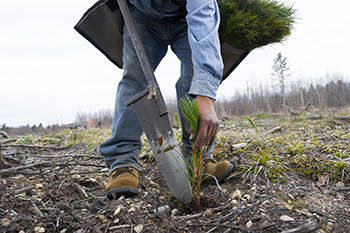 The DNR responsibly manages 3.9 million acres of state forest land using techniques such as timber harvests, planting and prescribed burns to keep forests thriving and healthy. The DNR responsibly manages 3.9 million acres of state forest land using techniques such as timber harvests, planting and prescribed burns to keep forests thriving and healthy.
To make the work more efficient and easier to oversee, the DNR divides those millions of acres into 15 forest management units, which are further divided into compartments. Management activity in each forest management unit is finalized two years in advance. This summer and fall, recommendations for 2023 are being presented.
Open houses for 2021 are virtual, and you can give input by email, phone or mail during the designated time frame. This is a great opportunity to offer input to foresters, wildlife biologists and other DNR professionals regarding forest plans.
After the end of each comment period, a public compartment review meeting will take place, where foresters present the DNR’s final decisions on management activities. The DNR reviews 10% of the state forest annually. That equates to about 400,000 acres or roughly 220 compartments.
For more information, including a link to the interactive forest map showing details of all forest management activities, visit Michigan.gov/ForestInput.
Below are the comment periods taking place in September and the related compartment reviews. Contact the area unit manager to make arrangements to view the compartment review meeting online or listen over the phone.
- Crystal Falls: Comments through Sept. 16; compartment review is Oct. 28. Contact Dan McNamee, 906-875-6622.
- Grayling: Comments Sept. 7-Oct. 7; compartment review is Oct. 21. Contact Thomas Barnes, 989-348-6371, ext. 7440.
- Gwinn: Comments through Sept. 21; compartment review is Oct. 12. Contact Kristen Matson, 906-346-9201.
- Newberry: Comments Sept. 14-Oct. 14; compartment review is Oct. 26. Contact Keith Magnusson, 906-291-0120.
- Sault Ste. Marie: Comments through Sept. 15; compartment review is Oct. 5. Contact Karen Rodock, 906-875-1039.
- Shingleton: Comments Aug. 31-Sept. 30; compartment review is Oct. 14. Contact Bob Burnham, 906-420-1645.
See a full comment period schedule. |
 On the Ground – Michigan United Conservation Clubs’ volunteer wildlife habitat improvement program in partnership with the DNR – is looking for volunteers for the following projects in September. On the Ground – Michigan United Conservation Clubs’ volunteer wildlife habitat improvement program in partnership with the DNR – is looking for volunteers for the following projects in September.
Prairie Restoration at Pierce Cedar Creek Institute in Hastings (Barry County)
9 a.m. to 2 p.m. Saturday, Sept. 11
Help remove woody vegetation to begin restoring a prairie located on publicly accessible Pierce Cedar Creek Institute land. To prepare the field for a prescribed burn and other ecological restoration efforts, a hedgerow and other woody shrubs need to be removed from a 5-acre field. This project will benefit a variety of native wildlife and pollinator species. All necessary equipment, including personal protective equipment, will be provided, although volunteers are encouraged to bring their own work gloves. All registered volunteers will receive a free lunch and volunteer appreciation gift.
Register for prairie restoration event.
Tree Planting in the Escanaba River State Forest (Menominee County)
9 a.m. to 2 p.m. Saturday, Sept. 18
Help plant and fence more than 100 native trees and shrubs to improve wildlife habitat throughout openings within the Escanaba River State Forest near Daggett Township. These native, mast-producing trees will benefit a variety of wildlife including ring-necked pheasant, wild turkey, ruffed grouse, golden-winged warbler and American woodcock. Shovels and all necessary equipment will be provided, although volunteers are encouraged to bring their own work gloves if possible. All registered volunteers will receive a free lunch and volunteer appreciation gift.
Register for tree-planting event. |
|
|
The beloved Pigeon River Country State Forest in the northern Lower Peninsula recently added two new properties, and we need your input on how outdoor enthusiasts will access this land to hike, fish, hunt, view elk and more. Share your thoughts via two short surveys, available now through Sept. 17, and help us shape the type of recreation opportunities and access, including motorized access, offered in each area. |
|
Check out new NotMISpecies webinar series sessions for an abundance of information, resources and field experiences to help identify and manage invasive species in Michigan. Sept. 15, it’s “Fowl play,” exploring the work of protecting managed waterfowl hunt areas from the threat of invasives. Oct. 21, learn about how volunteering for a state park stewardship workday can help manage invasive species with “Just Do it!” |
|
|
|
|
|






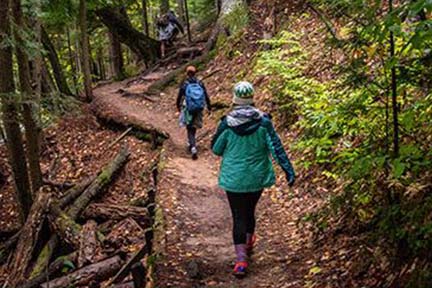


 The Michigan Freedom Trail Commission’s fourth annual Underground Railroad Heritage Gathering kicks off with weekly virtual presentations in September and culminates with a day-long event at the University of Michigan Oct. 2.
The Michigan Freedom Trail Commission’s fourth annual Underground Railroad Heritage Gathering kicks off with weekly virtual presentations in September and culminates with a day-long event at the University of Michigan Oct. 2.
 Join us at the Ralph A. MacMullan Conference Center in Roscommon Sept. 24-26 for
Join us at the Ralph A. MacMullan Conference Center in Roscommon Sept. 24-26 for 




 To manage invasive species already established in Michigan, the program targets proposals for novel and efficient control techniques and projects that improve detection and control methods through increased understanding of species biology and ecology.
To manage invasive species already established in Michigan, the program targets proposals for novel and efficient control techniques and projects that improve detection and control methods through increased understanding of species biology and ecology.
 In the last seven years, the program has awarded over $25 million to 173 projects, resulting in management of invasive species including hemlock woolly adelgid, phragmites and red swamp crayfish on more than 60,000 acres of land and water statewide.
In the last seven years, the program has awarded over $25 million to 173 projects, resulting in management of invasive species including hemlock woolly adelgid, phragmites and red swamp crayfish on more than 60,000 acres of land and water statewide.

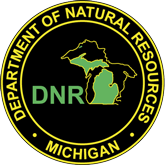



 Several state parks in southern Michigan have volunteer stewardship workdays coming up in September. Volunteers are needed to help remove invasive plants that threaten high-quality ecosystems in the parks.
Several state parks in southern Michigan have volunteer stewardship workdays coming up in September. Volunteers are needed to help remove invasive plants that threaten high-quality ecosystems in the parks.
 The DNR responsibly manages 3.9 million acres of state forest land using techniques such as timber harvests, planting and prescribed burns to keep forests thriving and healthy.
The DNR responsibly manages 3.9 million acres of state forest land using techniques such as timber harvests, planting and prescribed burns to keep forests thriving and healthy.
